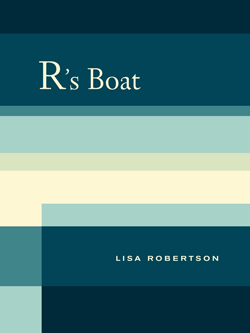R’s Boat
by Lisa Robertson
reviewed by Broc Rossell
R’s Boat is the most recent collection of poems by acclaimed Canadian poet Lisa Robertson, her first to be issued by an American publisher. Robertson is the author of more than twenty collections and chapbooks, mostly projects comprised of long poetic sequences rather than individual poems, and collectively expressing a poetic sensibility that yokes the genre’s form and eloquence to sustained intellectual or aesthetic explorations.
Robertson cycles through thematic concerns. Her 2004 chapbook, Rousseau’s Boat, for instance, is built around “keyword searches on about twenty years’ worth of notebooks,” according to one interview. In much the same way, her full-length publications sometimes grow out of shorter ones: just as Soft Architecture: A Manifesto became Occasional Work and Seven Walks from the Office for Soft Architecture, R’s Boat consists of six long poems, three of which previously appeared as chapbooks in limited Canadian editions. Those chapbooks have been revised to fit together as sections, turned toward each together like facets of a conversation.
R’s Boat is virtually unclassifiable in the context of contemporary poetry. Robertson’s profoundly informed but autodidactic stance—despite lecturing widely and having held positions at Berkeley, Cambridge, and the American University in Paris, she holds no academic degrees—has given rise to a body of work that tends to tie critics in knots. Perhaps because the Kootenay School of Writing in Vancouver (where she was an active member) and the Language movement were organized at roughly the same time, she is often misidentified as a Language poet. But, says Robertson, “I feel more conditioned by the FLQ [the terrorist organization Quebec Liberation Front] than by the language poets.”
Ironically, Robertson is sometimes also mistaken for a lyric poet; she often uses an “I,” and usually writes in sentences. Her syntax is elastic, agile, and lucid; the weight of what’s expressed is cumulative and resists reduction. Her work is also transparently and seductively self-aware, calling attention to its own presence and process:
To make something from what I am
From proximity, bitterness
Is just brutal
So I turned to syllables
And if I degenerate into style
It’s because I love it very much
This acknowledgment of choices being made, this modern mode of the petite ars poetica, is perhaps something like lyric.
Ultimately, the labels fail. It’s more accurate to say that Robertson is the rare experimental poet who manages to imbue her work with sustained emotional depth and complexity. In R’s Boat, she turns her ear toward what is often mistaken to be the essence of poetry—subjectivity—alternatively embracing and interrogating it. Robertson explores so many idioms of the subjective, uses the subjective “I” in so many hundreds of variations, that the work ultimately posits subjectivity as a kind of poetic performance. The sensibility expressed by the book cannot be reduced to any of its parts; we cannot find any particular moment where one subjective statement is more strongly expressed than another. Instead, it is dispersed throughout the text, and thus raises the question of the subjective to an elevation slightly above the page.
In R’s Boat, Robertson has penned a post-conceptual, post-lyric, relentlessly self-examining performance of memory and sincerity that manages, remarkably, to be both theoretically concerned and deeply emotive.
I want to mention the hammered fastenings in ordinary speech.
I was willing to suppose there existed nothing really.
But what I want to do here is infiltrate sincerity.
I was wrong.
I’m for the flickering effect of vernaculars.
I will construct men or women.
I had insisted on my body’s joy and little else.
I will not remember, only transcribe.
The ebb and flow of upright and italicized lines, which texture the first section of the book, feel meandering and discursive in a decidedly contemporary way. So does a nimble “I” that bends back and forth through various tenses, suggesting a relation to history that is as much political as it is personal.
For the epigraph to the chapbook Rousseau’s Boat, Robertson chooses this line from Rousseau: “The ebb and flow of this water, its ongoing sound swelling with vibration that set adrift my outer senses, rhythmically took the place of the strong emotions my dreaminess had placated, and I felt in myself so pleasurably and effortlessly the sensation of existing, without troubling to think.” It is sometimes hard to determine whether the reactions evoked by R’s Boat are emotions or thoughts; this, too, is one of its oddly affecting pleasures. It is high praise to say of Robertson’s work that it has arrived in advance of the lexicon required to categorize it. I suspect that we will one day discuss the idiosyncrasy of her work the way we talk about Robert Creeley’s today.
Published on October 28, 2013

